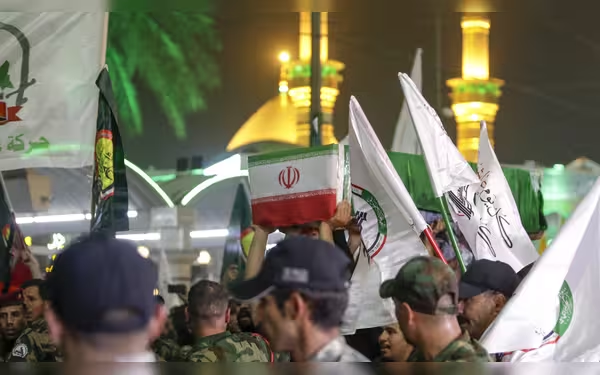Saturday, November 16, 2024 07:56 PM
Funeral Service for Iranian General Abbas Nilforoushan in Karbala
- Iranian General Abbas Nilforoushan killed in Israeli air strike.
- Funeral held in Karbala, led by Ayatollah Ali Al-Sistani's representative.
- Iran retaliates with missile strikes against Israel following the deaths.
 Image Credits: arabnewspk
Image Credits: arabnewspkFuneral for Iranian General Abbas Nilforoushan held in Karbala, following his death in an Israeli air strike, escalating regional tensions.
KARBALA, Iraq: The recent funeral service for Iranian Revolutionary Guard General Abbas Nilforoushan has drawn significant attention, especially following his tragic death in an Israeli air strike. This event, which also claimed the life of Hezbollah chief Hassan Nasrallah, took place on September 27 in south Beirut, a region known for its strong ties to Hezbollah.
Nilforoushan was a prominent figure in the Islamic Revolutionary Guard Corps Quds Force, which is responsible for Iran's foreign military operations. His body was recovered from the site of the air strike, and the Iranian Guard Corps confirmed this on Friday. The funeral procession commenced in Iraq, a country that holds deep religious significance for Shia Muslims, particularly in the city of Karbala.
During the funeral, which took place at the shrine of Imam Husayn, a representative of Iraq’s leading Shia cleric, Ayatollah Ali Al-Sistani, led the prayers. The atmosphere was charged with emotion as mourners expressed their anger, chanting “death to Israel” and waving flags representing Iran, Hezbollah, and the Iraqi Shia armed group, Kataib Hezbollah. This display of solidarity highlights the strong connections between these groups and their shared grievances against Israel.
After the prayers, the funeral cortege proceeded to the nearby Al-Abbas shrine before continuing to Najaf, another important Shia holy city. According to reports from the Sepah news agency, which is linked to the Revolutionary Guard Corps, Nilforoushan’s body is set to be sent to Mashhad, a revered city in Iran. A further ceremony is scheduled to take place in Tehran’s Imam Hossein Square, culminating in his burial in Isfahan, his hometown.
The backdrop to this funeral is a series of escalating tensions in the region. On October 1, Iran retaliated against the killings of Nilforoushan, Nasrallah, and Hamas political chief Ismail Haniyeh by launching approximately 200 missiles at Israel. This act of aggression has heightened fears of further conflict, with Israel vowing to respond decisively. Defense Minister Yoav Gallant has warned that the retaliation will be “deadly, precise, and surprising,” indicating a potential for increased violence in the already volatile region.
As the situation unfolds, it is crucial to understand the implications of these events not only for Iran and Israel but for the broader Middle East. The funeral of General Nilforoushan serves as a stark reminder of the ongoing conflicts and the deep-seated animosities that continue to shape the geopolitical landscape. The reactions from various factions will likely influence future interactions and could lead to further escalations, making it essential for observers to stay informed about these developments.













